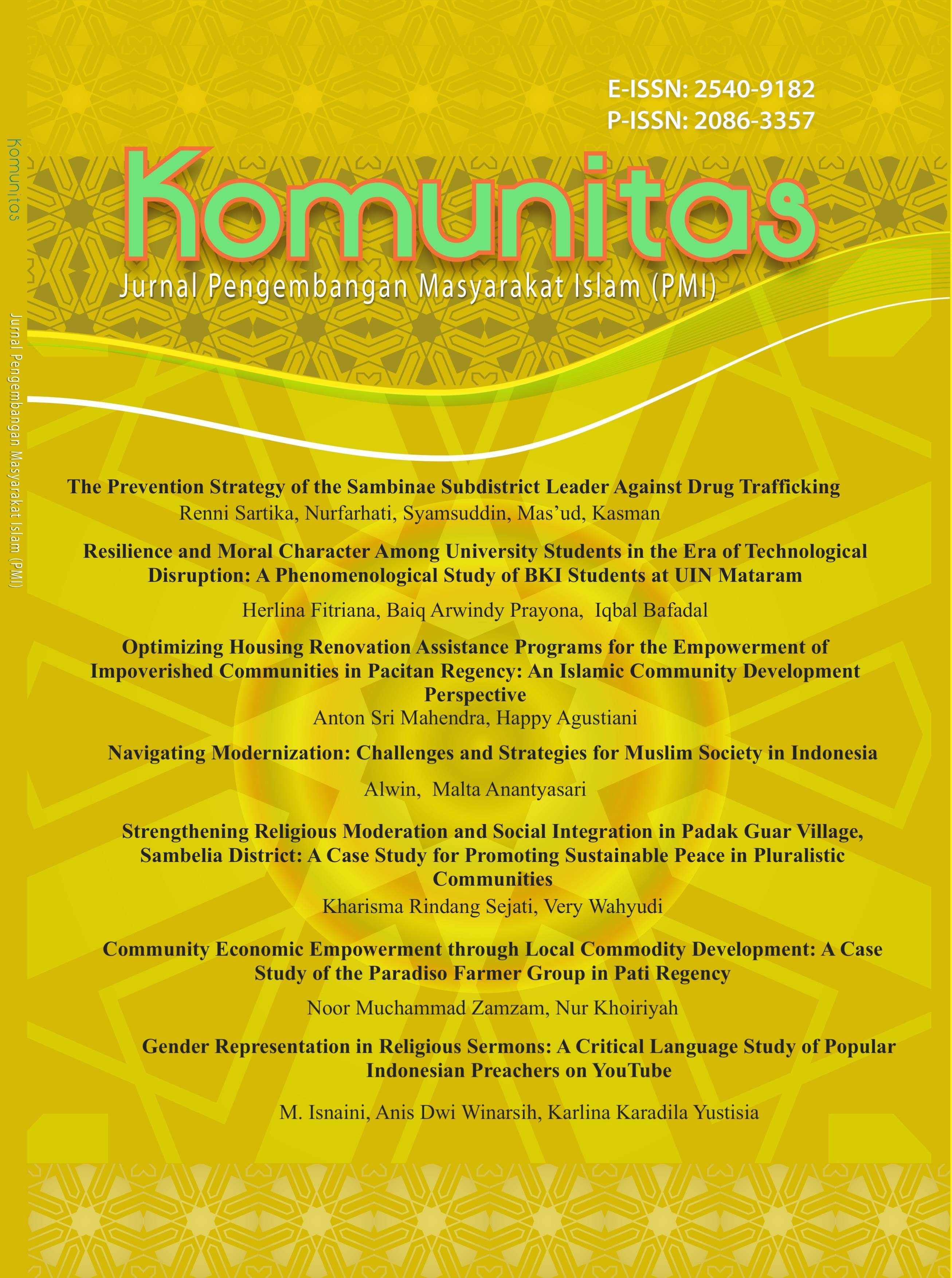Resilience and Moral Character Among University Students in the Era of Technological Disruption: A Phenomenological Study of BKI Students at UIN Mataram
DOI:
https://doi.org/10.20414/komunitas.v16i1.13401Keywords:
Moral character, Resilience, Students, TechnologyAbstract
Based on preliminary research findings, many students feel easily defeated by their circumstances and tend to complain. Additionally, many students experience a degradation in morality when communicating with lecturers. The method used in this study is qualitative with a phenomenological approach, interviewing 20 students from the BKI program. The results show that only 5 out of 20 students are resilient, while the other 15 tend to give up easily and experience stress, with 2 of them even contemplating suicide. Based on the interviews, it was found that each student is capable of both good and bad behaviors, such as stealing, lying, showing a lack of empathy, and being impolite toward elders. Their moral character varies, influenced by personal experiences, trauma, and their environmental conditions.
Downloads
References
Badhwar, N. K. (2017). Moral character. In N. E. Snow (Ed.), The Oxford Handbook of Virtue (pp. 367–389). Oxford University Press.
Berkowitz, M. W., & Bier, M. C. (2005). What Works in Character Education: A Research-Driven Guide for Educators. Washington, DC: Character Education Partnership.
Cohen, T. R., & Morse, L. (2014). Moral character: What it is and what it does. Research in Organizational Behavior, 34, 43–61. https://doi.org/10.1016/j.riob.2014.08.003
Creswell, J. W., & Clark, V. L. P. (2011). Designing and conducting mixed methods research (2nd ed.). Thousand Oaks: Sage.
Creswell, J. W. (2017). Research design: Pendekatan kualitatif, kuantitatif dan mixed. Yogyakarta: Pustaka Pelajar.
Flach, F. (1989). Resilience: Discovering new strength at times of stress. New York: Ballantine Books.
Handikasari, R. H., Innawati, J., & Johan, A. (2018). Hubungan intensitas penggunaan media sosial dengan gejala depresi mahasiswa kedokteran (Studi pada mahasiswa kedokteran tingkat akhir yang menggunakan kurikulum modul terintegrasi). Jurnal Kedokteran Diponegoro, 7(2), 919-934.
Hardiyantoro, A., & Hardiyanto, S. (26 September 2023). Kronologi dan dugaan motif siswa MA di Demak bacok leher sang guru. Diunduh pada 1 Januari 2024 dari https://www.kompas.com/tren/read/2023/09/26/071500165/kronologi-dan-dugaan-motif-siswa-ma-di-demak-bacok-leher-sang-guru.
Kohlberg, L. (1981). Essays on Moral Development, Volume I: The Philosophy of Moral Development. New York: Harper & Row.
Lanier, K. (2017). 5 things HR professionals need to know about generation Z: Thought leaders share their views on the HR profession and its direction for the future. Strategic HR Review, 16(6), 288-290.
Lickona, T. (1991). Educating for Character: How Our Schools Can Teach Respect and Responsibility. New York: Bantam Books.
Masten, A. S., & Reed, M.-G. (2002). Resilience in development. In C. R. Snyder & S. J. Lopez (Eds.), The handbook of positive psychology (pp. 74–88). New York, NY: Oxford University Press
Masten, A. S., & Wright, M. O. (2010). Resilience over the lifespan: Developmental perspectives on resistance, recovery, and transformation. In J. W. Reich, A. J. Zautra, & J. S. Hall (Eds.), Handbook of adult resilience (pp. 213–237). New York, NY: Guilford
Métais, C., Burel, N., Gillham, J. E., Tarquinio, C., & Martin-Krumm, C. (2022). Integrative review of the recent literature on human resilience: From concepts, theories, and discussions towards a complex understanding. Europe’s Journal of Psychology, 18(1), 98-119.
Meinanto, D., Putrawan, B. K., & Simangunsong, A. (2022). Degradasi moral generasi Z: Tinjauan etis teologis terhadap phubbing. Jurnal Teologi dan Pendidikan Kristen, 3(1), 21-32.
Priporas, C. V., Stylos, N., & Fotiadis, A. K. (2017). Generation Z consumers' expectations of interactions in smart retailing: A future agenda. Computers in Human Behavior, 77, 374-381.
Pusat Kurikulum dan Perbukuan, Kementerian Pendidikan Nasional. (2010). Pendidikan Karakter di Sekolah: Panduan untuk Kepala Sekolah dan Guru. Jakarta: Kementerian Pendidikan Nasional.
Rabbani, Dana, A. & Najicha, Fatma, U. (2023). Pengaruh Perkembangan Teknologi Terhadap Kehidupan dan Interaksi Sosisal Masyarakat Indonesia. ResearchGate.
Reivich, K. and Shatté, A. (2002) The Resilience Factor: 7 Essential Skills for Overcoming Life’s Inevitable Obstacles. Broadway Books.
Rutter, M. (2022). Resilience and the importance of social relationships: Protecting youth from adverse outcomes.
Ryan, K., & Bohlin, K. E. (1999). Building Character in Schools: Practical Ways to Bring Moral Instruction to Life. San Francisco: Jossey-Bass
Shensa, A., Escobar-Viera, C. G., Sidani, J. E., et al. (2017). Problematic social media use and depressive symptoms among U.S. young adults: A nationally representative study. Social Science and Medicine.
Shobah, R. N. (26 Desember 2023). 4 fakta kasus viral Akbar Sarosa, guru hukum murid tidak sholat: Kronologi hingga gagal mediasi. Diunduh tanggal 07 Januari 2024 dari https://kaltim.tribunnews.com/2023/10/10/4-fakta-kasus-viral-akbar-sarosa-guru-hukum-murid-tidak-sholat-kronologi-hingga-gagalnya-mediasi.
Downloads
Published
How to Cite
Issue
Section
License
Copyright (c) 2025 Herlina Fitriana, Baiq Arwindi Prayona, Iqbal Bafadal

This work is licensed under a Creative Commons Attribution-ShareAlike 4.0 International License.




